How Labor lost its credibility in tackling antisemitism
While many in the caucus believe Anthony Albanese has been unfairly maligned, few defended his judgement when a Melbourne synagogue was firebombed in a blatant antisemitic attack.
National
Don't miss out on the headlines from National. Followed categories will be added to My News.
It was “tone deaf,” one Labor MP privately observed when pictures emerged of Anthony Albanese playing tennis in Perth just a day after a Melbourne synagogue had been firebombed in a blatant antisemitic attack.
While many in the caucus believe the Prime Minister has been unfairly maligned for his response to Australia’s social cohesion crisis sparked by conflict in the Middle East, few defended Albanese’s judgement that Saturday.
At the time, the Jewish community in the Melbourne suburb of Ripponlea was still reeling from the attack on the Adass Israel Synagogue in the early hours of the previous morning, which police would go on to investigate as a terror incident.

Albanese later characterised his two-hours on the court with former South Australian Labor Premier Jay Weatherill as “some exercise” – a normal activity after a jam-packed morning of appointments in Perth.
But the images only fuelled the growing perception his government has been slow to address the rise of overt antisemitism in Australia in the last year.
One Labor MP says the PM “should have got there sooner” to visit the burnt-out remains of the synagogue and stand in solidarity with the Adass people.
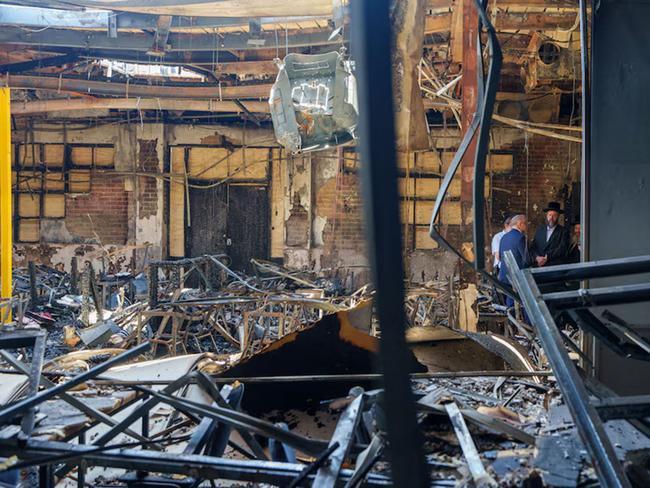
But another points out in the aftermath of the firebombing, Albanese was receiving daily security briefings, he authorised $32.5 million to enhance security at Jewish community sites within 24 hours of receiving the request from the Executive Council of Australian Jewry and was in Canberra for secure meetings that lead to the establishment of the AFP Special Operation Avalite for Antisemitism.
“In a normal week, you’d say that’s a lot,” the MP says.
How then, has Labor seemingly so badly lost its credibility in tackling antisemitism?
In the eyes of some in the party, blame lies more with Foreign Minister Penny Wong than Albanese.
Multiple MPs, as well as leaders in the Jewish community who spoke anonymously to be more candid, are at pains to emphasise they do not believe Albanese or Wong are in any way “antisemites”.
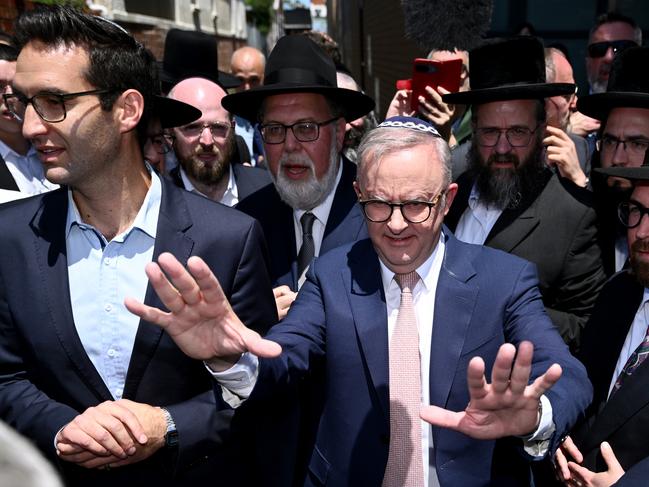
Their concern instead, is that Australia’s diplomatic shift on Israel-Palestine has created an “permissive environment” that has “enabled” antisemitic behaviours.
Wong’s UN interventions and comments about Israel-Palestine in speeches have not only had almost no effect on outcomes in the Middle East, they have also contributed very little to social cohesion efforts at home.
Most pro-Palestine supporters want a radical step change in Labor’s approach to Israel, and have not been appeased by the government’s gradual shifting stance.
While the Jewish community fears Australia’s actions on the world stage have distracted the government from focusing on antisemitism domestically.
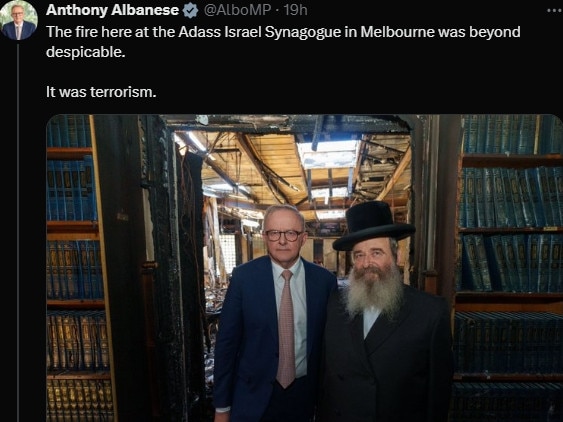
One Labor MP says the government’s constant mentioning of conflict in the Middle East at a time of heightened tensions is not helping.
Days after the synagogue attack, Wong gave a speech in Adelaide in which she said Israel must comply with international law, as Russia and China are expected to.
The comparison infuriated supporters of Israel.
“Why did she have to do the speech?” one Labor MP laments. “How does that bring the temperature down?”
One Jewish community member describes Labor’s change in voting at the United Nations toward more pro-Palestine resolutions as having eroded support for Australia’s ally, Israel, through “death by a thousand cuts”.
They do not believe this was always Labor’s intent, but rather over time the party succumbed to position simply out of “politics”.
“Some of this is definitely about Western Sydney and other multicultural communities where Labor is looking to maintain support,” they say.
Within days of the synagogue attack, a car was torched and anti-Israel graffiti scrawled on houses in the eastern Sydney suburb of Woollahra.
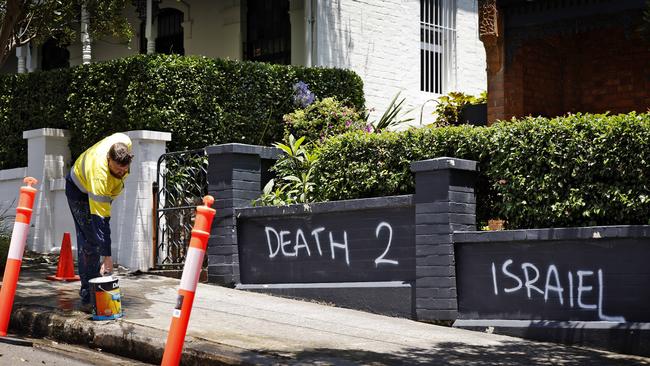
The two incidents followed the previous torching of a car in the same suburb, and a shocking attack on the office of Labor Macnamara MP Josh Burns.
Burns, who is Jewish, has been on the coalface of the rise of antisemitism in Australia, and this week criticised the Coalition’s further politicisation of the sensitive issue.
He accused Opposition leader Peter Dutton of intervening to prevent his home affairs spokesman James Paterson from reading a statement regarding the Adass firebombing on Burns’ behalf as the Labor MP had unfortunately lost his voice on the day of the attack.
In an opinion piece, Burns says he believes Dutton took the opportunity to “play politics” over allowing the two sides to present a unified front after the “terrifying” attack.
Burns has also warned the “consistent dismissal and gaslighting of Jewish people across Australia” has “festered into the dangerous escalation” seen in the last week.
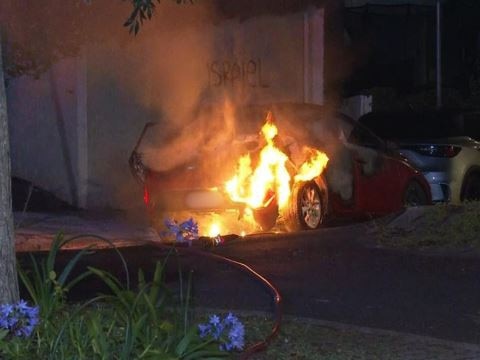
In the wake of the Woollahra car torching, Albanese appeared close to tears standing in the Sydney Jewish Museum as he also issued a plea for national unity to end the “evil” of antisemitism.
But his words were again undercut by Labor’s decision to side against Israel and support two pro-Palestine resolutions at the UN the very next morning.
Unlike in domestic politics where the cut and thrust of daily governing rarely allows for the perfect to become the enemy of the good, in the world of international diplomacy the opposite is generally true.
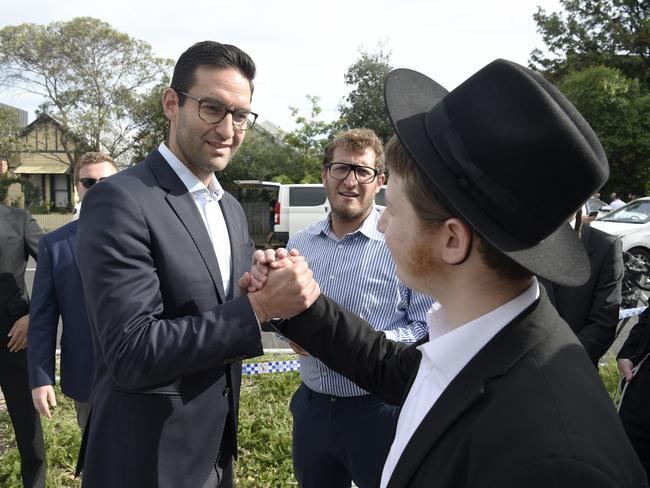
The wording, or failure to mention one aspect of an issue can result in a nation opposing an entire UN resolution, even if that country agrees with the majority of the proposition.
It is this kind of approach Labor has walked away from in recent months.
The government has shifted on key Israel-Palestine votes from a “no” to an “abstain” or even further to a “yes” if the resolution is generally supportive of Labor’s core principles around a two-state solution and bringing peace to the region.
While this has actually placed Australia more in alignment with allies in Europe and Asia, it has put the country increasingly at odds with the US and Israel who will not back resolutions that omit things like demanding the freeing of Israeli hostages held by Hamas.
Zionist Federation of Australia Jeremy Leibler describes the relationship between the Jewish community and the Albanese government as “more strained than ever”.
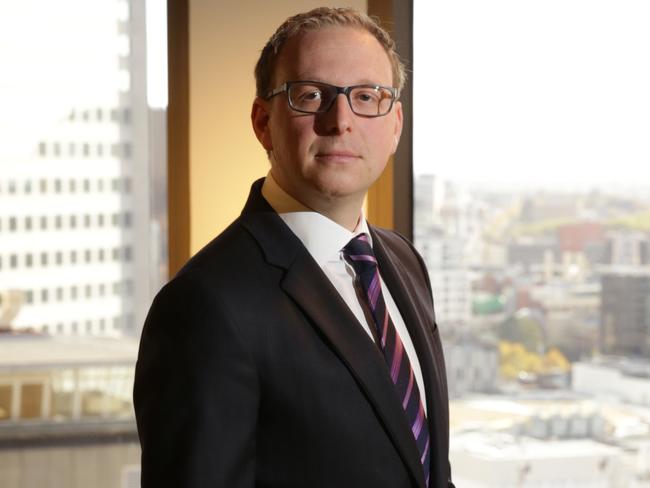
But he says the source of that strain is not “personalities or agendas within the government” nor, from his perspective, a “lack of consultation or engagement with the community”.
“It is fundamentally about the government’s decision to abandon a longstanding tradition of principled support for an important ally as it faces a war with terrorist organisations on multiple fronts and a failure to demonstrate moral clarity in calling out antisemitism,” he says.
Leibler says the past week of antisemitic attacks has “starkly exposed” what the Jewish community has been warning about for more than a year: “a steady rise in antisemitism, fuelled by incitement on our streets, campuses, and online platforms, is manifesting in real-world harm”.
“The government’s slow response has left the community feeling unprotected and unheard.”
More Coverage
Originally published as How Labor lost its credibility in tackling antisemitism





